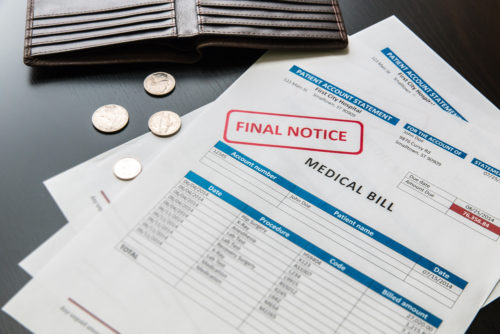The costs of healthcare in the United States are on the rise, so much so that some people avoid doctors and hospitals in the event of illness or injury. While this isn’t necessarily safe, it’s understandable, considering the increasing costs of medical care and the rising amount of medical debt.
If you have outstanding medical bills, it’s important to pay them off right away. Many people think that their credit won’t be damaged if a bill goes into collections. Whether you pay your bills on time or not, medical bills you aren’t aware of can go into collections and drastically hurt your credit score.
Learn more about how the medical bill collections process works, including what happens when your bill goes into collections, how it can impact your credit, and what to do if your medical bills go into collections.
Table of Contents
What Happens When Your Medical Bill Goes to Collections
When you neglect to pay your medical bills, healthcare professionals will eventually send them to a debt collector who can then turn your records over to a credit bureau — thus hurting your credit score.
Matters get a lot more difficult as soon as a bill has reached collections. Overdue payments are reported as delinquent and eventually, after a certain period of time, end up in collections. The original creditor hands over responsibility to collect on the bill, selling their debt to a collections agency so that they can get paid for the medical care provided. From there, the collections agency comes after you and what you owe — and then some.
How Medical Debt Can Impact Your Credit Score
Unpaid medical bills will eventually be reported to a credit bureau by a debt collector, drastically impacting your credit score.
Debt collection has a huge impact on your credit score, but medical debt collections impact your score even more if they go into collections. According to Experian, your payment history accounts for 35% of your credit score.
According to the Medical Debt Relief Act of 2019, there’s a one year grace period for paying back your medical debt. The three main credit bureaus, Equifax, Experian, and TransUnion, treat medical debt collections differently. These bureaus are subject to the new federal law instituting a grace period for unpaid medical debt.
This means that the credit bureau can’t show your unpaid medical collections on your credit score until one year past the date when the bureau received word of your delinquency. Ultimately, this gives you one year to pay off your medical debt.
Unlike most collection accounts, which can remain on your credit report for several years, medical debt is expunged if it has been paid or is actively being paid.
What to Do When Your Medical Bill Goes to Collections
Working with a collections agency isn’t easy, but sometimes it is necessary. Remember, paying off medical debts that have gone to collections won’t immediately heal your suffering credit score, but if you do make a payment, the bad mark on your credit must be removed within 45 days.
Paying medical bills, however, is the hard part. If you have the funds in a savings account or emergency fund, you can pay your medical bills in one lump sum. If you’re taking this route, be sure to write the invoice number on the check so that your doctor’s office doesn’t get your payment confused. It may be easier to call the office directly to make arrangements to pay in full.
If you can’t pay in full or even right away, it’s important to keep in contact with your doctor so that they don’t think you’re ignoring the bill. It may be possible to structure a payment plan, depending on your care provider. Call the office directly to find out if you can schedule consistent monthly payments to prevent your bill from being sent to collections.
How to Prevent a Medical Bill From Going to Collections
A medical bill that goes into collections can be detrimental to your credit score. In order to prevent that from happening, follow the steps broken down below.
Understand Your Medical Bill
You’ll want to thoroughly read your medical bill as soon as you get it to make sure you understand everything it’s asking you to pay for. Reading through your bill can prevent any mistakes from going unnoticed, such as being overcharged or charged twice for the same thing. If you notice anything odd or details that raise a red flag, bring those questions and concerns directly to your doctor’s office. Clarify these details as quickly as possible to prevent your bill from going into collections.
Take Notes
In the event that you have to speak to your hospital or your insurance agency to address a concern, make sure to have a pen and paper on hand. You’ll want to jot down everything, including names, phone numbers, dates, and exact expenses that are discussed. By doing this, you’ll have an accurate log of information for any further negotiations you will need to make.
Negotiate
Remember that your medical bill is only an initial offer. You’ll want to attempt to dispute the cost. Lowering the cost of your medical bill from the get-go will create a domino effect. Down the line, it will make paying back your bill easier, and possibly prevent you from having a huge debt in the first place.
Image Source: https://depositphotos.com/





